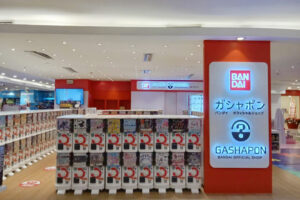
Gashapon: A capsule of surprise
FOR MANY Filipinos, Japanese anime characters like Dragon Ball’s Goku, Sailor Moon, and Pikachu from Pokémon hold a special place in childhood memories as they often brightened early mornings before school. These childhood memories can be rekindled through Gashapon stations as these toy vending machines from Bandai Namco offer customers iconic anime figures in collectible capsules. The most interesting part is that the machine and many of the figures are actually made in the Philippines.
Every drop of a coin into the Gashapon station holds the promise of a surprise capsule, which is exciting for both children and collectors worldwide. While Gashapon has its origins in Japan, there’s a good chance that the machine dispensing the capsules is actually made in Lipa City, Batangas, by Bandai Namco Philippines Inc. (BNPI).
BNPI Senior Manager Arvin Salud told BusinessWorld that BNPI is responsible for over 80% to 90% of the global production of Gashapon station machines, serving as the backbone of the popular capsule toy brand.
Mr. Salud said that BNPI manufactures around 300 to 400 Gashapon stations each day — translating to around 8,000 to 9,000 machines per month. In addition to producing the machines, they are also responsible for creating the toys and capsules found in every Gashapon machine.
BNPI has been producing these machines since 2015, bringing a spark of joy and inspiring fans all over the world, Mr. Salud said.
“In terms of our quality at tsaka yung craftsmanship ng pagkakagawa ng mga toys namin siguro ayun talaga yung hinahanap nila [In terms of our quality and the craftsmanship of how our toys are made, I think that’s really what they’re looking for],” Mr. Salud said in an interview, highlighting fans’ love for the Gashapon stations.
The BNPI’s mission goes beyond manufacturing toys; it also celebrates creativity and craftsmanship in every Gashapon station they create, Mr. Salud said in a statement.
As most Gashapon toys are made from plastic, Mr. Salud highlighted that BNPI is actively working on efforts to recycle the plastic capsules, aiming to reduce waste and promote sustainability.
“Normally yung habol is yung toy diba inside (Normally, what people are after is the toy, right, inside?)… We are collecting that one (the capsule) and recycling it to our factory,” Mr. Salud said.
With the growing demand, Mr. Salud also told BusinessWorld that BNPI has plans to expand its manufacturing operations to two additional locations in 2026. — Edg Adrian A. Eva
